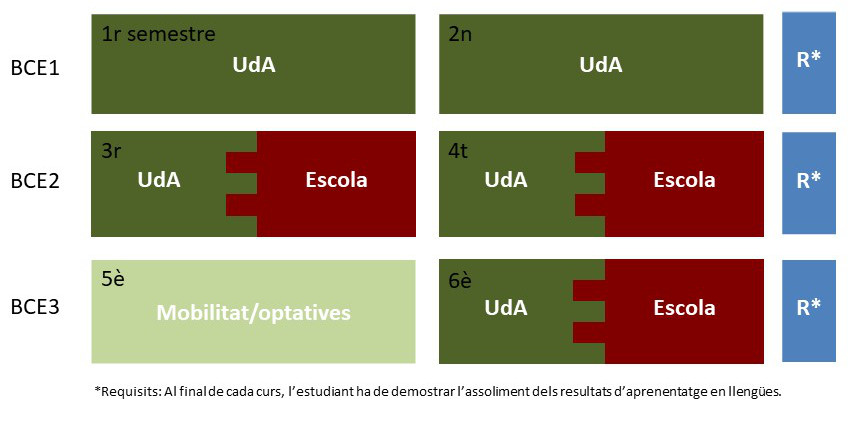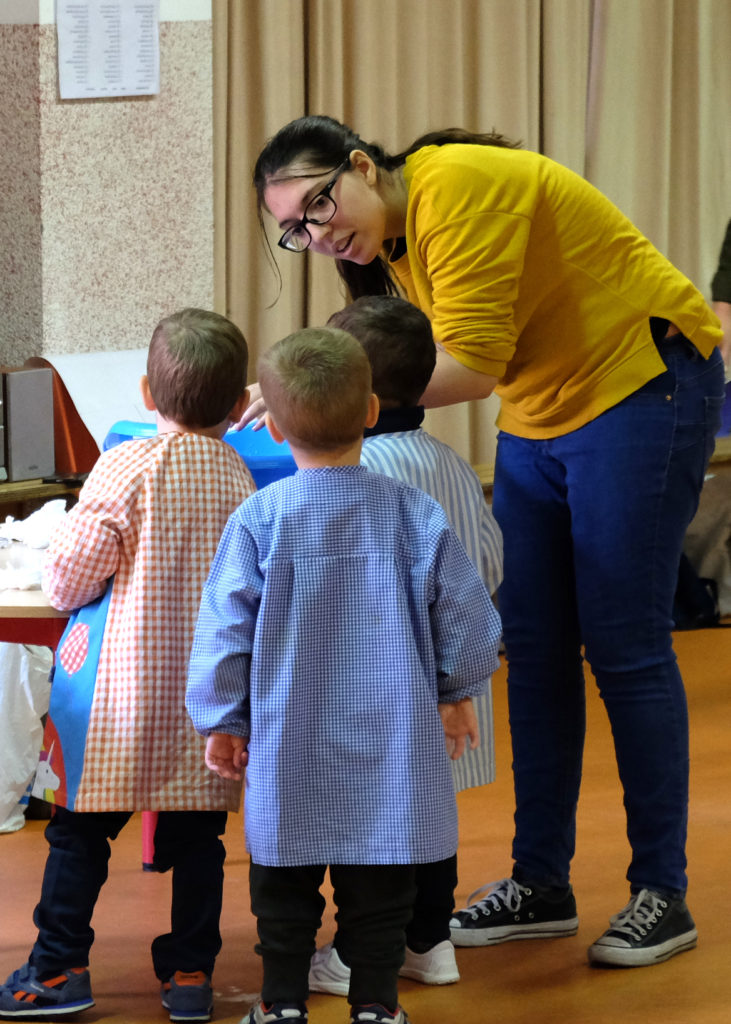Bachelor of Teaching and Learning
(early childhood and primary)
The Bachelor of Teaching and Learning educates early childhood and primary school teachers who can meet the learning needs of children between 0 and 12 years old and teach classes in different languages. It provides knowledge of the pedagogical methodologies used in Andorran schools, as well as competences for democratic citizenship and the defence of human rights associated with the Council of Europe. In addition, the bachelor’s degree places emphasis on innovation and the use of technologies in the pedagogical field.
The Bachelor of Teaching and Learning is evaluated and accredited by the AQUA (Andorran Agency for the Quality of Higher Education), which ensures its quality and European recognition. Students who pass these courses can obtain a Bachelor of Teaching and Learning, a state qualification issued by the Andorran Government.
The study programme was published in the Butlletí Oficial del Principat d’Andorra (Official Gazette of the Principality of Andorra) on 5 September 2018.
The University of Andorra is a member of: Association for Teacher Education in Europe
Distinctive Features
The studies have a double modality, in such a way that during the second and third years the academic activity at the university is combined, in an integrated manner, with internships at schools with the aim of adapting the education to the reality of the school and extending the bonds between theory and practice to improve the preparation of the future teachers.
During the fifth semester, a training or academic internship can be completed abroad to reinforce linguistic competences, among other skills.
The bachelor’s degree is multi-lingual. The students select their linguistic pathway, with the choice of a language of mention other than Catalan (English or French) in which they must acquire the ability to convey contents. At the end of each year the minimum levels established in Catalan, English and French must be achieved. The internships can also be conducted in Spanish.
The Bachelor of Teaching and Learning was the first to adapt to the new educational model of the University of Andorra. It’s a competence-based methodology that eliminates the classic concept of the “subject”. Each semester is divided into two modules, in which students must overcome a challenge by means of guided work, individual work and seminars. The learning outcomes that lead to the acquisition of specific and cross-disciplinary competences are thus achieved.
The study programme places democratic culture, intercultural dialogue and sustainability at the centre of the education of the future teachers.
The employment rate of graduates in Teaching and Learning at the UdA is almost 100% (according to the labour market outcomes studies conducted by AQUA).
European level:
EHEA’s first cycle
Modality:
on-campus
Credit load:
180 European credits
Duration:
6 semesters
Languages:
Catalan, English and French
Calendar:
from September to June
Contact:
Alexandra Saz Peñamaria (asaz@uda.ad)
As set out in the study programme, the educational programme comprises 180 European credits, divided into three full-time academic years with a six-semester structure, each with 30 credits. These studies can also be completed part-time by adapting their length.
The 180 European credits of the educational programme are broken down as follows:
- 150 compulsory credits. Of the above, 25 correspond to internships at schools and must be completed in the third, fourth and sixth semesters.
- 30 optional credits, which must be completed during the fifth semester.
The European credits corresponding to the internships at schools are integrated into the syllabus of the modules of the study programme and are identified with the extension U+E (university-school).
The study programme is made up of modules that are distributed as follows:
| SEMESTERS | MODULES (mostly taught in Catalan) | CREDITS |
|---|---|---|
| 1 | School, educational system and teaching | 15 |
| Learning and development in educational contexts | 15 | |
| 2 | Teaching and learning experimental sciences I | 15 |
| Teaching and learning languages, body language and artistic expression | 15 | |
| 3 | Teaching and learning social sciences in a democratic culture | 15 (11U+4E) |
| Teaching and learning mathematics | 15 (11U+4E) | |
| 4 | Teaching and learning integrated in a second language I | 15 (11U+4E) |
| Teaching and learning experimental sciences II | 15 (11U+4E) | |
| 5 | Mobility | 30 |
| 6 | Teaching and learning integrated in a second language II | 15 (11U+4E) |
| Bachelor final project | 15 (10U+5E) | |
| Total | 180 |
Applicants must hold one of the following qualifications:
- Andorran high school diploma
- Andorran Advanced Professional Diploma
- Access test to higher education for people aged over 25
Or an equivalent qualification, recognised by Government of Andorra.
It is advisable to have a minimum level of B2 in Catalan, B1 in the language of mention and A2 in the third language, in accordance with the linguistic focus of the bachelor’s degree.
Students who obtain the Bachelor of Teaching and Learning at the University of Andorra will be able to achieve the following competences, among others:
CROSS-DISCIPLINARY COMPETENCES
- To communicate, orally and in writing, in Catalan and in other languages, including the analysis and summary of the discourse.
- To communicate with other people by providing information tailored to the needs of the interlocutors.
- To work in inter-disciplinary and networked teams.
- To use basic strategies to predict and resolve problems, conflicts and changes in the professional field.
- To search for, manage, analyse and use the information independently in a professional environment.
- To organise and plan work and further studies.
- To use and apply information and communication technology.
- To be aware of the social, environmental, economic and legal repercussions of professional activities.
- To learn independently and acquire new knowledge on a constant basis.
- To interpret and apply knowledge in accordance with ethical values.
SPECIFIC COMPETENCES
- To manage situations with integrated teaching-learning of contents and languages in multi-lingual and multi-cultural contexts.
- To plan the educational intervention from a global perspective, taking into account the characteristics of the students, the diversified educational methodologies and the references established in the educational programmes.
- To manage group dynamics that encourage the development of competences based on democratic participation, cooperative learning and the positive resolution of conflicts.
- To regulate the teaching-learning processes upon the basis of the evidence gathered in the evaluation of the students while encouraging the self-regulation of the learning.
- To adapt the curricular elements, methodological variables and resources available, especially the technological resources, to the characteristics of the students and their individual and particular needs.
- To develop a democratic culture and sustainability in all the educational actions by fostering values, attitudes, aptitudes, knowledge and critical understanding of the world.
- To create mechanisms for the participation and decision-making of students in the different areas of the educational process upon the basis of the democratic culture.
- To guide students through their educational process and steer students and families in the making of educational decisions.
- To manage the teaching and learning situations that incorporate the elements of the digital culture and the use of learning and knowledge technologies.
- To manage work groups for the carrying out of educational projects, with different actors from the educational community and society in general, taking into account Andorra’s educational structure.
- To innovate in educational practice upon the basis of research and exchanges of experiences, within the possibilities and limits of education in today’s society and the models to improve quality at schools.
- To build models of representation of the world with varying degrees of complexity, based on mastery of the contents of the disciplinary areas and their teaching methodologies, applying critical thinking and a cross-disciplinary vision.
Students will be able to complete part-time or full-time studies by enrolling every semester for a minimum of 15 and a maximum of 30 credits. In exceptional situations, a request for enrolling for more credits may be submitted, which will be assessed by the university’s academic management.
At the end of each year or even-numbered semester (S2, S4, S6), students must demonstrate the achievement of the learning outcomes associated with the educational languages.
In order to enroll in the second course, the student must have passed at least 3 modules of the first course.

It is advisable to have a minimum level of B2 in Catalan, B1 in the language of mention and A2 in the third language, in accordance with the linguistic focus of the bachelor’s degree.
The linguistic focus establishes the following minimum levels of each language at the end of each year, in order to guarantee optimum learning progression:
| 1ST YEAR | 2ND YEAR | 3RD YEAR | |
|
Catalan |
B2.2 |
C1.1 |
C1.2 |
|
Language of mention (English or French) |
B2.1 |
B2.2 |
C1.1 |
|
3rd language (English or French) |
B1.2 |
B2.1 |
B2.2 |
Linguistic aproach (in Catalan)
Internships are one of the Bachelor of Teaching and Learning’s pillars, enabling students to obtain first-hand knowledge of the reality of the school. They are completed at schools in any of the three educational systems in Andorra and are conducted with the academic activity at the university in an integrated manner. The University of Andorra has also signed agreements to allow training stays abroad with:
- Principality of Monaco
- Government of Catalonia
To promote the academic mobility of the students, the study programme is designed in such a way that during the fifth semester an educational or academic internship can be completed at a university or school abroad with the aim of reinforcing linguistic competences in the language of mention (English or French), among others.
Director of the College of Health and Educational Sciences: Virginia Larraz Rada
Coordinator of the Bachelor of Teaching and Learning: Alexandra Saz Peñamaria (asaz@uda.ad)
The list of lecturers of the Bachelor can be viewed in the teaching plans of each of the subjects, which have links on the study programme list.
In addition, the Directory of the University of Andorra enables students to search for and access the contact information on the UdA’s teaching, technical and administrative staff.
The Bachelor of Teaching and Learning offers a wide range of professional opportunities:
- Teacher at crèches and nursery and primary schools.
- Management of schools: from kindergartens to nursery and primary schools.
- Teacher at special education schools, in hospital classrooms, at adult schools and at penitentiary institutions.
- Teacher in non-formal education environments for children aged 0 to 12.
- Professional expert in education in cultural institutions and the educational services of museums.
- Professional expert in education at companies devoted to the production of educational materials.
- Professional expert in education in the business field.
This bachelor provides access to second cycle studies (master’s degrees) in the countries in the European Higher Education Area.
Study programme publication (Official Gazette of the Principality of Andorra):
- Correcció d’errata del 31-1-2024 per la qual s’esmenen errades constatades en el Decret del 29-8-218, d’aprovació del pla d’estudis del bàtxelor en Ciències de l’educació de la Universitat d’Andorra
- Decret del 29-8-2018, d’aprovació del pla d’estudis del bàtxelor en Ciències de l’educació de la Universitat d’Andorra
Andorran Agency for the Quality of Higher Education accreditation:



